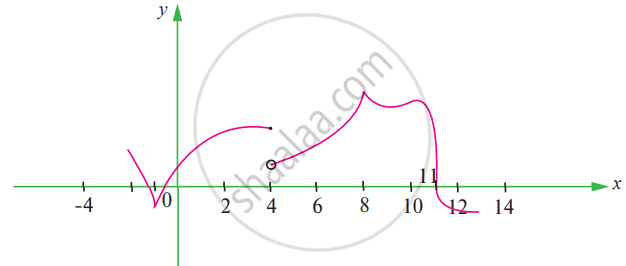Advertisements
Advertisements
Question
Find the derivatives of the following functions using first principle.
f(x) = 6
Solution
`f(x + Deltax)` = 6
`f(x + Deltax) - f(x)` = 6 – 6
`(f(x + Deltax) - f(x))/(Deltax)` = 0
`lim_(Deltax -> 0) (f(x + Deltax) - f(x))/(Deltax)` = 0
`f"'"(x)` = 0
APPEARS IN
RELATED QUESTIONS
Find the derivatives of the following functions using first principle.
f(x) = – 4x + 7
Find the derivatives of the following functions using first principle.
f(x) = – x2 + 2
Find the derivatives from the left and from the right at x = 1 (if they exist) of the following functions. Are the functions differentiable at x = 1?
`f(x) = |x - 1|`
Find the derivatives from the left and from the right at x = 1 (if they exist) of the following functions. Are the functions differentiable at x = 1?
`f(x) = sqrt(1 - x^2)`
Find the derivatives from the left and from the right at x = 1 (if they exist) of the following functions. Are the functions differentiable at x = 1?
`f(x) = {{:(x",", x ≤ 1),(x^2",", x > 1):}`
Determine whether the following function is differentiable at the indicated values.
f(x) = x |x| at x = 0
Determine whether the following function is differentiable at the indicated values.
f(x) = |x| + |x – 1| at x = 0, 1
The graph of f is shown below. State with reasons that x values (the numbers), at which f is not differentiable.
If f(x) = |x + 100| + x2, test whether f’(–100) exists.
Examine the differentiability of functions in R by drawing the diagram
|cos x|
Choose the correct alternative:
If f(x) = x2 – 3x, then the points at which f(x) = f’(x) are
Choose the correct alternative:
If y = mx + c and f(0) = f’(0) = 1, then f(2) is
Choose the correct alternative:
If f(x) = x + 2, then f'(f(x)) at x = 4 is
Choose the correct alternative:
If g(x) = (x2 + 2x + 1) f(x) and f(0) = 5 and `lim_(x -> 0) (f(x) - 5)/x` = 4, then g'(0) is
Choose the correct alternative:
If f(x) = `{{:(x + 2, - 1 < x < 3),(5, x = 3),(8 - x, x > 3):}` , then at x = 3, f'(x) is
